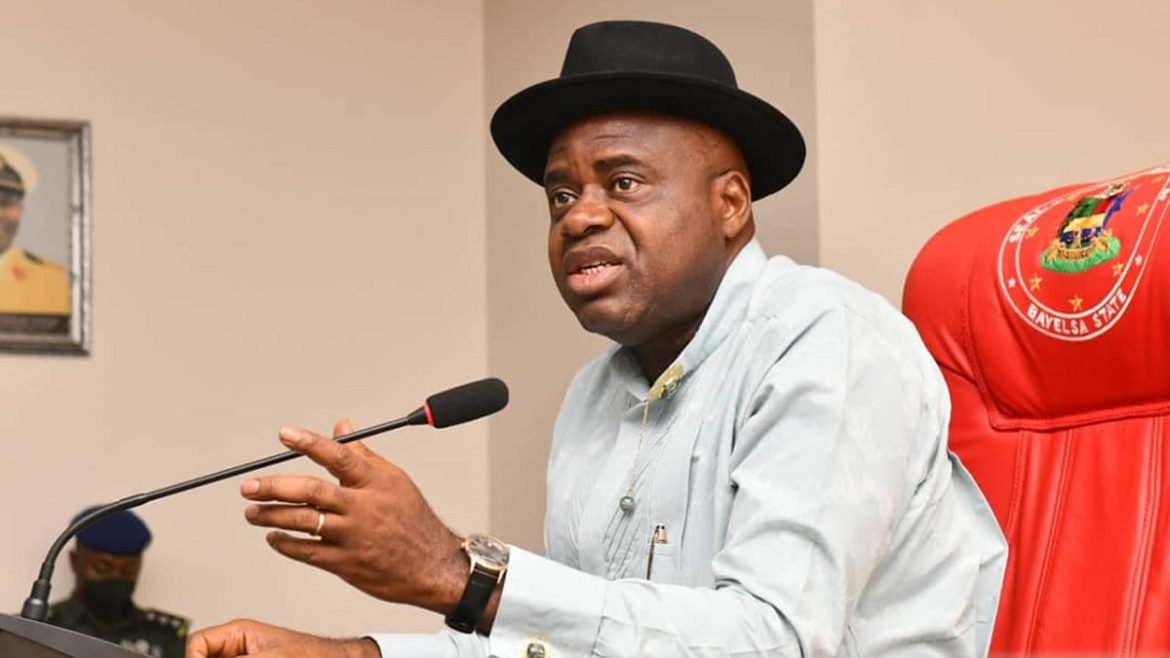383
By Myke Agunwa
Bayelsa State Governor, Douye Diri, on Monday, formally defected from the Peoples Democratic Party (PDP) to the ruling All Progressives Congress (APC), ending weeks of speculation about his political future and deepening the gale of defections that has recently swept through the opposition party.
The defection ceremony, held at the Samson Siasia Stadium in Yenagoa, was marked by pomp and celebration as thousands of supporters from the state’s eight local government areas thronged the venue to welcome the governor into the APC fold.
Supporters dressed in white T-shirts bearing APC insignia and Diri’s portrait flooded major streets of the state capital, singing and drumming as they marched in solidarity convoys before converging at the stadium.
Governor Diri, who tendered his resignation from the PDP last week, said his decision to join the APC was driven by the need to align Bayelsa with the “centre of power” to attract greater federal attention and development to the oil-rich state.
“Today marks a new dawn for Bayelsa State. This is not about politics of bitterness or division. It is about unity, progress, and ensuring that Bayelsa benefits fully from the programmes and policies of the federal government.
We have to move forward as one people, beyond party lines, to deliver good governance to our citizens,” Diri told cheering supporters.
The defection attracted a galaxy of APC stalwarts and South-South political heavyweights, including Governor Umo Eno of Akwa Ibom, Governor Sheriff Oborevwori of Delta, former Delta Governor Ifeanyi Okowa, Governor Lucky Orimisan Aiyedatiwa of Ondo, former Edo Governor Adams Oshiomhole, and Minister of Regional Development, Engr. Abubakar Momoh.
Party leaders described Diri’s defection as a “historic realignment” that would strengthen the APC’s presence in the Niger Delta ahead of the 2027 general elections.
Oshiomhole, in his remarks, praised Diri’s “bold and patriotic decision,” saying it reflected the growing national appeal of the ruling party.
“Governor Diri has shown that leadership is about putting the people first,” Oshiomhole said. “His entry into the APC is a clear sign that Nigerians are embracing the politics of development, not division.”
However, The PDP has reacted angrily to the governor’s defection, describing it as a “betrayal of trust” and a “selfish move motivated by personal ambition.”
In a statement issued in Abuja, PDP National Publicity Secretary Debo Ologunagba said the party was “deeply disappointed” by Diri’s decision, adding that the governor had benefited immensely from the PDP and should have remained loyal.
“Governor Diri’s defection is unfortunate but not surprising, given the sustained pressure and inducements from the ruling party. The PDP remains strong and will continue to defend the interests of the people of Bayelsa.
“The governor’s decision does not reflect the will of the people of Bayelsa, who have always stood firmly with the PDP since 1999,” Ologunagba said.
He noted that the party’s National Working Committee (NWC) would soon meet to deliberate on the latest development and take appropriate action.
Diri’s exit is the latest in a string of high-profile defections that have hit the PDP in recent months, threatening to erode its influence ahead of the 2027 polls.
Analysts say the defections reflect growing discontent within the PDP over internal leadership disputes, especially the ongoing power tussle between acting National Chairman Umar Damagum and National Secretary Senator Samuel Anyanwu, which has split the party into two rival factions.
The crisis has already forced the postponement of the party’s planned national convention and led to multiple suspensions within its National Working Committee.



